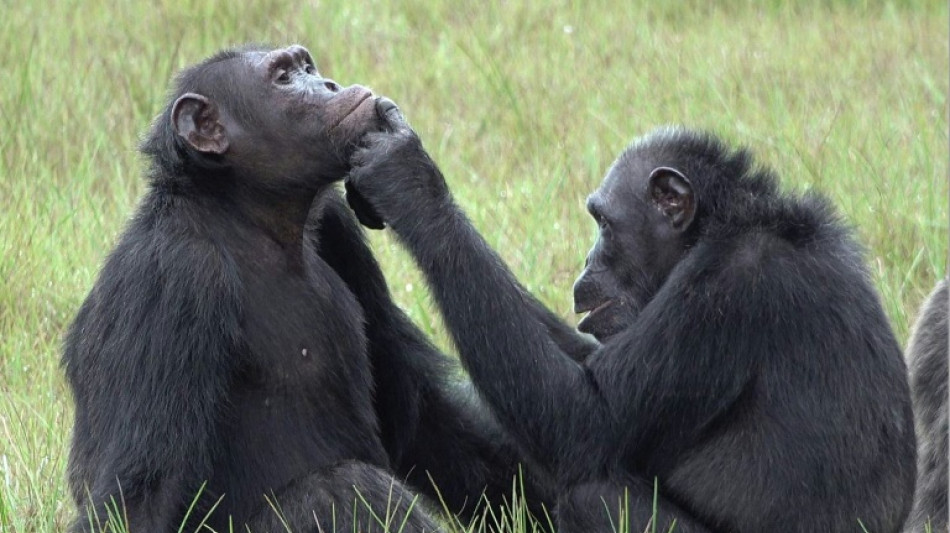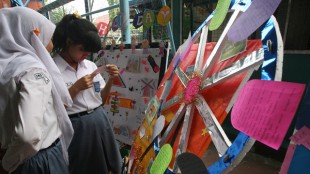
-
 China's birth-rate push sputters as couples stay child-free
China's birth-rate push sputters as couples stay child-free
-
'Not about condoms': Chinese shrug off contraceptive tax

-
 Root's majestic 160 powers England to 384 in final Ashes Test
Root's majestic 160 powers England to 384 in final Ashes Test
-
Chalamet boosts Oscar bid with Critics Choice Awards win

-
 'Tuna King' pays record $3.2 mn for bluefin at Tokyo auction
'Tuna King' pays record $3.2 mn for bluefin at Tokyo auction
-
Tech firms lead Asian markets higher, oil swings after Maduro ouster

-
 Cricket Australia boss hits out at 'archaic' bad light rules
Cricket Australia boss hits out at 'archaic' bad light rules
-
Trump insists 'we need Greenland'

-
 Century-maker Root steers England to 336-6 in final Ashes Test
Century-maker Root steers England to 336-6 in final Ashes Test
-
'Free our president', Maduro supporters demand at rally

-
 Danish PM calls on US to stop 'threatening' Greenland
Danish PM calls on US to stop 'threatening' Greenland
-
North Korea tests hypersonic missiles, says nuclear forces ready for war

-
 Root in Ponting territory with 41st Test century at 5th Ashes Test
Root in Ponting territory with 41st Test century at 5th Ashes Test
-
South Korea's Lee to meet Xi with trade, Pyongyang on the agenda

-
 Messi's Miami sign Canada goalkeeper St. Clair
Messi's Miami sign Canada goalkeeper St. Clair
-
Pistons top Cavs as Pacers' NBA misery continues

-
 Gonzalo treble helps Real Madrid thrash Betis, Atletico hopes dented
Gonzalo treble helps Real Madrid thrash Betis, Atletico hopes dented
-
Djokovic quits players' union he co-founded

-
 Anne Frank's step-sister, Holocaust survivor Eva Schloss dies
Anne Frank's step-sister, Holocaust survivor Eva Schloss dies
-
France's Le Garrec inspires La Rochelle to Toulon rout

-
 Hosts Morocco reach AFCON quarter-finals as Cameroon knock out South Africa
Hosts Morocco reach AFCON quarter-finals as Cameroon knock out South Africa
-
Inter Milan reclaim Serie A summit

-
 Atletico title hopes dented in Real Sociedad draw
Atletico title hopes dented in Real Sociedad draw
-
Doue, Dembele light up first Paris derby in over 35 years

-
 Swiss grieve as all fire victims identified -- half of them under 18
Swiss grieve as all fire victims identified -- half of them under 18
-
Panthers advance to NFL playoffs after Falcons beat Saints

-
 Cameroon end South Africa hopes to reach AFCON last eight
Cameroon end South Africa hopes to reach AFCON last eight
-
'A gift' to be back, says Rodri despite Man City stumble

-
 Colombian guerrillas vow to confront US 'imperialism'
Colombian guerrillas vow to confront US 'imperialism'
-
Morocco lose injured playmaker Ounahi for rest of AFCON bid

-
 Trump threatens new Venezuela leader after raid to seize Maduro
Trump threatens new Venezuela leader after raid to seize Maduro
-
Man City title hopes hit by managerless Chelsea

-
 Man City held by Chelsea in major title blow, Liverpool denied in Fulham thriller
Man City held by Chelsea in major title blow, Liverpool denied in Fulham thriller
-
Managerless Chelsea dent Man City title hopes

-
 Ekitike's absence in Fulham draw leaves Slot with threadbare options
Ekitike's absence in Fulham draw leaves Slot with threadbare options
-
Delcy Rodriguez: From Maduro's 'tigress' to acting Venezuelan president

-
 Frank defends Johnson sale after Spurs jeered in Sunderland draw
Frank defends Johnson sale after Spurs jeered in Sunderland draw
-
France, UK conduct joint strikes against IS in Syria

-
 Amorim tells Man Utd hierarchy to 'do their job'
Amorim tells Man Utd hierarchy to 'do their job'
-
Diaz sends Morocco to AFCON quarter-finals

-
 Amorim takes heart from Man Utd character in battling Leeds draw
Amorim takes heart from Man Utd character in battling Leeds draw
-
Liverpool denied by late drama at Fulham, Man Utd held by Leeds

-
 Over 30 killed, several kidnapped in Nigeria
Over 30 killed, several kidnapped in Nigeria
-
Osaka wins after Raducanu pullout, Swiss book United Cup quarter-finals

-
 Liverpool held by Fulham after last-gasp Reed rocket
Liverpool held by Fulham after last-gasp Reed rocket
-
Gonzalo Garcia hits treble as Real Madrid thrash Betis without Mbappe

-
 Marseille crash to Ligue 1 defeat against Nantes
Marseille crash to Ligue 1 defeat against Nantes
-
Third 'Avatar' film passes the $1 billion mark worldwide

-
 US says ready to work with new Venezuelan authorities
US says ready to work with new Venezuelan authorities
-
Spanish protesters slam 'imperialist aggression' in Venezuela


Treating wounds with insects: the strange habits of Gabon chimps
How to treat a wound?
For humans, the first instinct would be to disinfect it and then cover it with a bandage.
But chimpanzees have invented a more creative method: catching insects and applying them directly to the open wound.
Scientists observed this behavior in chimpanzees in the West African nation of Gabon, noticing that the apes not only use insects to treat their own wounds, but also those of their peers.
The research, published Monday in the journal Current Biology, marks an important contribution to ongoing scientific debate about the ability of chimpanzees -- and of animals in general -- to selflessly help others.
"When you're going to school and you read in your biology books about the amazing things that animals can do," Simone Pika, a biologist at the University of Osnabruck in Germany and a co-author of the study, told AFP. "I think it could really be something like that that will end up in those books."
The project began in 2019, when an adult female chimpanzee named Suzee was observed inspecting a wound on the foot of her adolescent son.
Suzee then suddenly caught an insect out of the air, put it in her mouth, apparently squeezed it, and then applied it to her son's wound.
After extracting the insect from the wound, she applied it two more times.
The scene unfolded in Loango National Park on Gabon's Atlantic coast, where researchers are studying a group of 45 central chimpanzees, an endangered species.
Over the following 15 months, scientists saw chimpanzees administer the same treatment on themselves at least 19 times.
And on two other occasions they observed injured chimpanzees being treated in the same way by one or several fellow apes.
The wounds, sometimes several centimeters wide, can come from conflicts between members of same or an opposing group.
Far from protesting the treatment, the bruised chimpanzees were happy to be tended to.
"It takes lot of trust to put an insect in an open wound," said Pika. "They seem to understand that if you do this to me with this insect, then my wound gets better. It's amazing."
- Soothing properties? -
Researchers have not been able to identify what bug was used on the wounds, but they believe it to be a flying insect given the chimpanzees' rapid movement to catch it.
Pika says the insect could contain anti-inflammatory substances that have a soothing effect.
Insects are known to have various medical properties and researches will need to conduct more work to detect and study the insect in question.
Birds, bears, elephants and other animals have already been observed self-medicating, for example by eating plants.
But what is unique about chimpanzees is that they will treat not just themselves, but also help others.
Some scientists, however, still doubt the ability of animal species to exhibit prosocial behaviors, such as selflessly caring for others, Pika said.
But here the chimpanzees have nothing to gain, she stressed. So why do they do it?
In humans, prosocial behavior is generally linked to empathy.
Could the same feeling be at play in chimpanzees, Pika wondered.
"It is a hypothesis that we must study," she said.
P.Stevenson--AMWN


